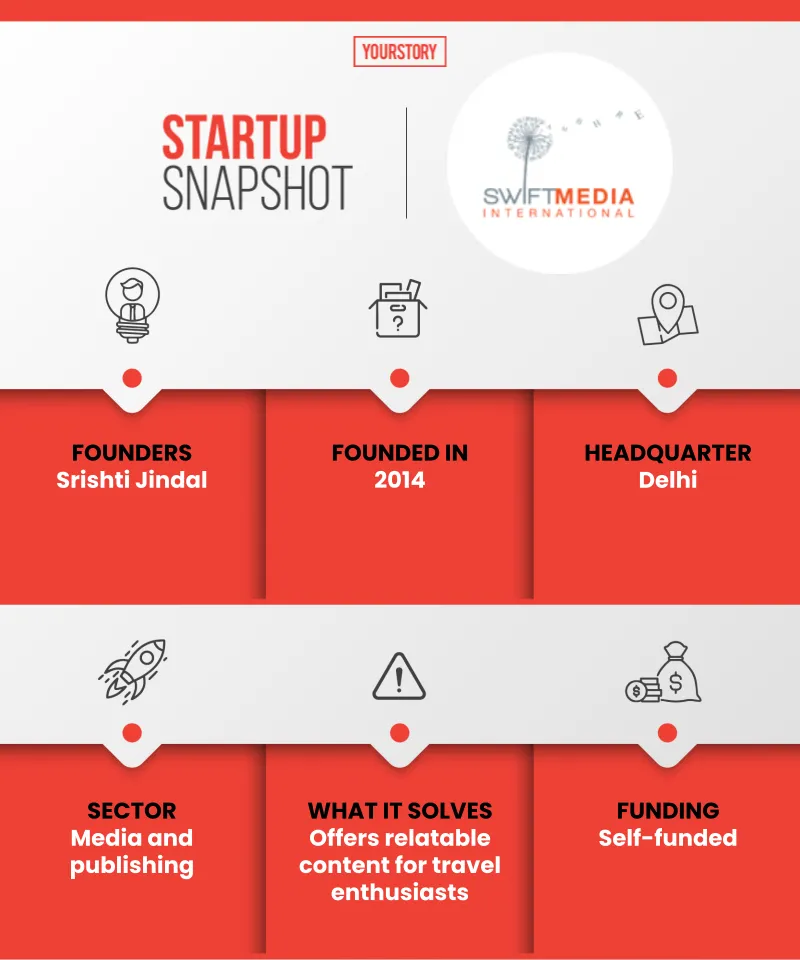Meet Shrishti Jindal, for whom entrepreneurship, philanthropy, and motherhood are all in a day’s work
Delhi-based entrepreneur Srishti Jindal received the APJ Abdul Kalam Award for innovation for turning a loss-making business into a multi crore venture.
As a student of mathematics and economics at Emory University in the US, Srishti Jindal was gearing up for life as a banker. Then came a summer internship that totally changed her course!
Srishti’s innate passion and talent for writing had got her the editor’s post with her school magazine. She also became a regular contributor for her college magazine, and eventually, she saw herself join a travel magazine that was running on losses in 2012.

Srishti Jindal, Founder of Swift Media International
In two years, Srishti had not only learnt the ropes of the media industry but also foresaw the magazine’s scope for catering to travel enthusiasts in a larger way. With loan from her parents, and her educational background in mathematics and economics finally coming to use, she bought the legal licenses and trademarks of the magazine and set up Swift Media International.
“I was confident of recovering my investment and knew I had a good deal before me,” she says.
Four years after buying the platform in 2014, Srishti had not only repaid the loans but turned it into a profitable business clocking Rs 75 crore in revenue in the FY 2018-2019. Although she hails from a business family, Srishti proved her mettle as an entrepreneur and went on to receive the APJ Abdul Kalam Award for Innovation in 2017.
Traversing the travel industry
Srishti says buying the existing platform was more than ideal as setting up anew would have involved a long period of getting publishing licenses, business registration, and other legal requirements.
Instead, she hit the ground running by changing the design and tone of the magazine to suit the taste and preference of millennial population. As a storyteller, she says that content and data are the two most valuable things.
“If you package data and if you really have a unique point of view, one can create relatable content people want to hear and that is very powerful. There is so much data out there, but if you just figure out your niche well, the opportunities are countless,” she says.
With a successful venture to her credit, there also come a fair share of challenges. She says people did not take her seriously in the beginning when she introduced herself as a founder with little professional experience.
“The tourism industry is one which has a lot of women but even then, there were glass ceilings I could feel. First of all, I am a woman and a young woman at that. I had to be more cautious and put in extra effort that would not have been required if I was older or a man,” she shares.
Speaking of market competition, she says, “I would like to look at someone like Conde Nast as competition, although they are far ahead of me right now. But I hope that is where I can be one day.”
As the business stabilised, Srishti launched a creative work and artist discovery platform, The Terrene. Although a global platform, she hopes to shine the spotlight on unique Indian works of art from nooks and corners of India that are tucked away from mainstream attention.
Srishti says it is purely a passion project and does not plan on commercialising it. Started with Rs 5 lakh, she hopes to build a community to sell their work and eventually offer scholarship and residential opportunities as well to promising candidates.

Turning the lockdown around
As spending became scarce during the lockdown, Srishti says she had to make tough calls of letting go of employees and making salary cuts.
She also noticed that artists and the creative industry were the first to suffer. “When discussing the economy and the larger scheme of things, art and artists are the last things that people think about and COVID-19 took a sharp turn,” she explains.
Srishti along with her father, Rajji Rai, dedicated their time to help migrant workers who were stranded during the nationwide lockdown. From March till early June, the duo fed nearly thousands of people daily with the help of volunteers in the slum areas of Delhi.
As a woman and mother to a seven-month-old daughter at the time, Srishti’s concern was the wellbeing of women and expecting mothers “because they are always the worst affected.” The entrepreneur prioritised vitamins, medicines, and necessities like sanitary napkins for women during the crisis.
Being a working mother

(Representational image)
Entrepreneurship popularly entails round-the-clock dedication to one’s venture. Becoming a new mother whilst looking after a growth stage business has not been easy, to say the least.
“It has been very hard and there's no sugarcoating it. People say that you can have it all, but it is just not easy. Every minute spent on work is time missed out with my baby. There is so much guilt around leaving your child, but I do my best to juggle both,” she says.
For workplaces to ensure that working women and mothers are given a level playing field, Srishti suggests they set a clearly defined KPI with flexible work timings, and make decisions on promotion and other opportunities based on their merit. Change begins at home, and as an entrepreneur, Srishti has ensured she follows these principles for her female employees.
Edited by Anju Narayanan






![[App Fridays] TikTok lovers, are you ready for Firework, the new short video platform in town?](https://images.yourstory.com/cs/2/a182c7e0140711e987e2f7248b252f46/Firework1571401406063png?mode=crop&crop=faces&ar=1%3A1&format=auto&w=1920&q=75)

![[Funding alert] AgroStar raises $70M Series D investment, will invest in tech and expansion](https://images.yourstory.com/cs/2/a9efa9c02dd911e9adc52d913c55075e/AgroStar-1638858370952.jpg?mode=crop&crop=faces&ar=1%3A1&format=auto&w=1920&q=75)
